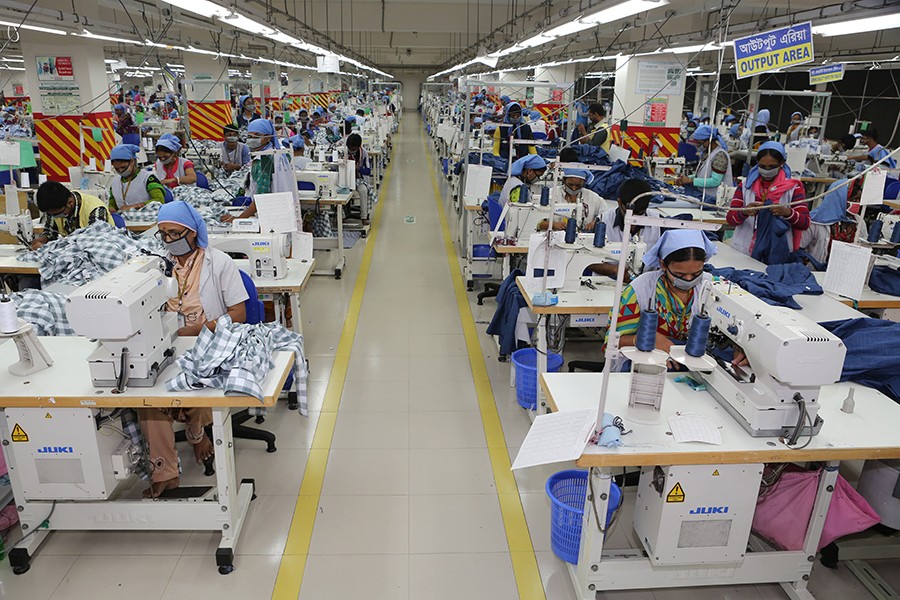The apparel apex body -- Bangladesh Garment Manufacturers and Exporters Association (BGMEA) -- has proposed the government to set a capacity development benchmark to rein in the unplanned expansion of the industry with growing concentration on a few items, sources said.
The BGMEA's move came after it has identified the unplanned capacity enhancement of the industry in a few products as one of the major setbacks for local apparel makers' poor price negotiation power and unhealthy competition among themselves.
Taking the situation into account and to put a cap on unplanned expansion, the apparel apex group of the country's readymade garment (RMG) in a letter to commerce ministry has made the proposal to form 'Base National Capacity', they added.
The proposal also intends to monitor investment and capacity of the industry in terms of product categories as only five items-t-shirt, shirt, trouser, jacket and sweater-accounted for 73 per cent or US$ 24.91 billion of the total US$ 34.13 billion RMG export earnings in last fiscal, they said.
Besides, about 74.14 per cent of the country's total RMG items exported last fiscal are made of cotton, showing its large dependency on the basic raw material and less efforts to grab the demands for value-added items using manmade or artificial fibre.
The BGMEA President Dr Rubana Huq in the letter to commerce minister has identified the unplanned capacity increase and expansion as one of the major fault lines in bargaining products price with buyers.
"…the industry has got excessive capacity in a few product lines having less sophistication and differentiation. This is a major weakness of the industry not only to bargain the right price but also to push to the next ladder of the price segment," she said.
The BGMEA's observations came after it has scrutinised the trends of locally made garments unit price, capital machinery imports and members' opinion.
The first female chief of BGMEA has suggested an industry-wide approach to evaluate the existing capacity of the industry and track the trend of existing expansion to deal with the situation and proposed to develop an industry-wide 'base national capacity'.
Ms Huq also opined that the proposed base national capacity would be an inclusive and authentic source of data that could be used to evaluate and regulate periodical investment and to put a cap on unplanned expansion.
According to the BGMEA, the average price of garment items has declined by 1.61 per cent in last four years.
A recent report by Better Buying funded by C&A Foundation also revealed that Bangladeshi suppliers are facing price cut pressure from global apparel brands and buyers.
About 36.4 per cent of Bangladeshi suppliers responded that they had to accept last-minute, low price orders to fill their capacity while 32 per cent reported that their capacity remained unused, it revealed.
38 per cent of the suppliers said that their buyers hold them to last year's prices, despite inflation and rising wages, according to the report.
The BGMEA in the letter has also stressed for collaboration among BGMEA, Bangladesh Knitwear Manufacturers and Exporters Association (BKMEA), Export Promotion Bureau (EPB) and Bangladesh Export Processing Zones Authority (BEPZA) saying that there are overlaps of exporters with these organisations contributing to the national capacity.
Some 4,621 factories are registered with the BGMEA in fiscal year (FY) 2018-19 which was 4,222 in FY 2013-14, according to its official website.
Since the tragic Rana Plaza building collapse that killed more than 1,100 people-mostly garment workers, some 400 new garment factories have been registered with the BGMEA.
Fresh letter of credits (L/C) worth US$ 3.80 billion has been opened for garment machinery import in last five fiscal years since FY 2014-15, according to BGMEA data.
On the other hand, about US$ 3.58 billion has been invested in textile machinery import during last five years, it showed.
Besides, additional 2,000 factories are registered with the BKMEA-another trade body mainly for knitwear manufacturers.
Sources said there are many BKMEA member factories that are also affiliated with BGMEA.
The BGMEA is going to organise a stakeholders' meeting next month over the formation of base national capacity, sources said.


